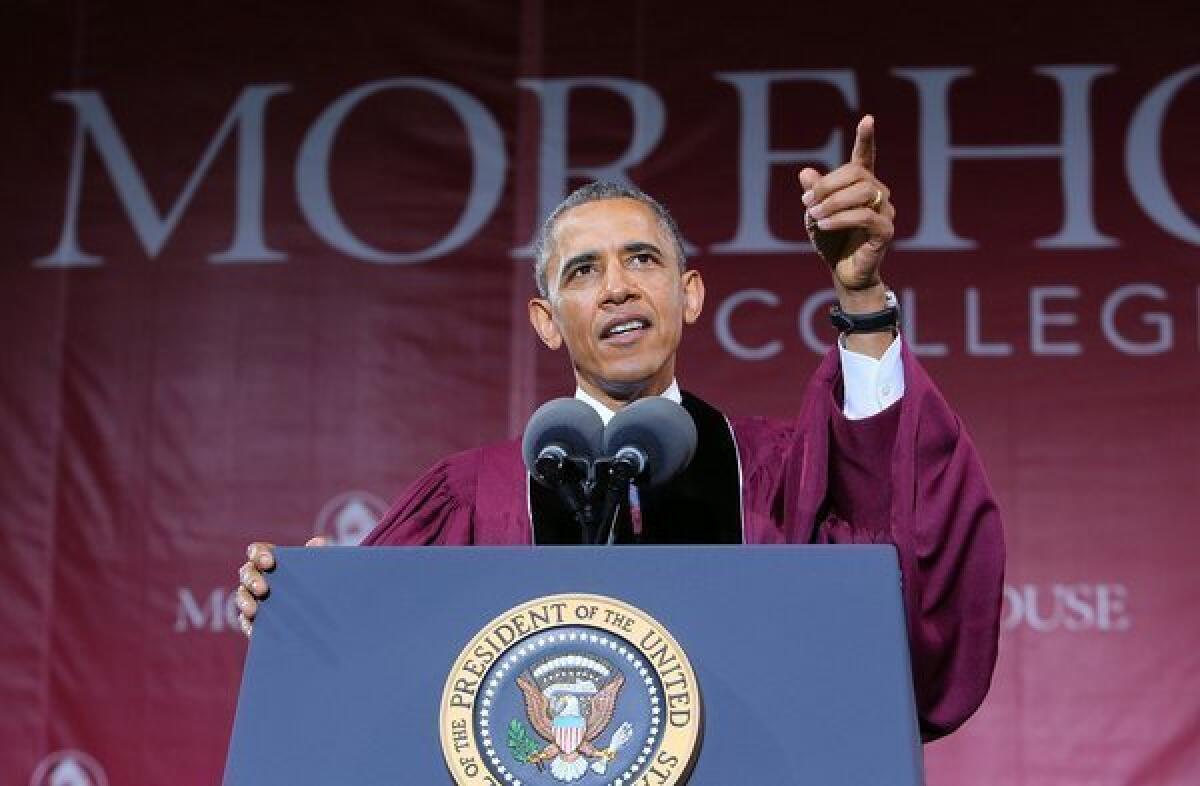Obama’s no-excuses credo

- Share via
On May 19, President Obama gave a commencement address at Morehouse College, a predominantly black men’s college in Atlanta. His words and message were forceful, timely and uniquely befitting the first African American president.
The president said what few others could say and still be considered politically acceptable. He debunked the notions of victimization and impotence so pervasive in talk about race, religion and ethnicity today, and encouraged the young black grads to “strive to do what’s right … [to] work harder and dream bigger.”
Obama laid waste to the advocates of doom and gloom — the Cornel Wests and Tavis Smileys, et al — who argue that not much has changed in America in terms of race relations and acceptance:
“Here, under the tutelage of men like Dr. [Benjamin] Mays, young Martin [Luther King] learned to be unafraid. And he, in turn, taught others to be unafraid. And over time, he taught a nation to be unafraid. And over the last 50 years, thanks to the moral force of Dr. King and a Moses generation that overcame their fear and their cynicism and their despair, barriers have come tumbling down and new doors of opportunity have swung open, and laws and hearts and minds have been changed to the point where someone who looks just like you can somehow come to serve as president of these United States of America.”
Just in case those in the audience and the rest of America didn’t get his point, the president laid out the implications of the new “open doors”:
“We’ve got no time for excuses. Not because the bitter legacy of slavery and segregation have vanished entirely; they have not. Not because racism and discrimination no longer exist; we know those are still out there. It’s just that in today’s hyperconnected, hypercompetitive world, with millions of young people from China and India and Brazil — many of whom started with a whole lot less than all of you did — all of them entering the global workforce alongside you, nobody is going to give you anything that you have not earned.”
That is a powerful answer to those who focus only on the “excuses” — the remnants of discriminatory conduct, the continued existence of hate groups, the 10% of the American public that seems intractably bigoted — as seeming proof that progress in the realm of race relations and tolerance is an illusion, a thin veneer on a persistently racist America. The president isn’t looking for perfection or nirvana but for an America in which hard work pays off and barriers of bigotry and discrimination remain rare and anomalous. He reminded his audience that whatever hurdles they have overcome pale “in comparison to the hardships previous generations endured — and they overcame them. And if they overcame them, you can overcome them too.”
That’s a forceful admonition to those who inflate problems, conjure up excuses and do everything to avoid asking people for effort, persistence and grit to confront what is a challenging and complex world for everyone. The president reminded the students that “if you stay hungry, if you keep hustling, if you keep on your grind and get other folks to do the same — nobody can stop you.... If you set an example in your own lives and do your part to help meet the challenges of our time, then I’m confident that, together, we will continue the never-ending task of perfecting our union.”
In this speech, Obama demolishes the arguments of the victimization peddlers and those who have continued to purvey a message of gloom and defeat, even in the face of mounting evidence to the contrary. They portray an America intent on frustrating and marginalizing minorities, making success nearly impossible.
The president has lived in, led and argues for a very different America. He has laid an important foundation for honest talk about race and acceptance in America. Let’s hope he is listened to.
David A. Lehrer is the president of Community Advocates Inc., a human relations organization chaired by former Los Angeles Mayor Richard Riordan. https://www.cai-la.org
More to Read
A cure for the common opinion
Get thought-provoking perspectives with our weekly newsletter.
You may occasionally receive promotional content from the Los Angeles Times.









